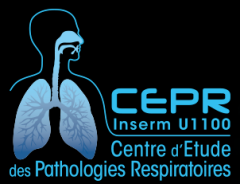Les pathologies respiratoires ont un impact médical et socio-économique très important. L’organisation mondiale de la santé (OMS) classe ainsi les pneumonies et la bronchopneumopathie chronique obstructive (BPCO) parmi les dix principales causes de décès au niveau mondial, ce qui représente près de 10 millions de décès par an. En Europe, les coûts directs des soins associés représentent à eux seuls au moins 55 milliards d’euros annuellement, et lorsqu'on tient compte des conséquences indirectes (incapacité, années de vie perdues), les coûts atteignent près de 380 milliards d’euros. En dépit de cette situation critique, les traitements existants sont limités car s’ils soulagent certains symptômes, ils sont rarement curatifs. Ces données soulignent donc le besoin urgent de développer une recherche innovante visant à mieux comprendre la physiopathologie des maladies respiratoires et à élaborer des dispositifs de thérapies ciblées plus efficaces.
Le Centre d’Etude des Pathologies Respiratoires (CEPR) a pour objectif de développer une recherche innovante visant à mieux comprendre la physiopathologie de ces pathologies et à améliorer les dispositifs de thérapies inhalées grâce aux expertises multiples et complémentaires existantes au sein de ses 3 équipes. L’effectif du CEPR inclut en effet des immunologistes, des microbiologistes, des biochimistes spécialistes des protéases et des anti-protéases, des experts des aérosols thérapeutiques, des experts en modèles murins et primates de pathologies pulmonaires ainsi que des cliniciens, bénéficiant d’une reconnaissance nationale et internationale dans leurs domaines respectifs. Cette diversité est une richesse qui permet le développement d’une recherche à la fois collaborative, translationnelle et productive visant à améliorer les traitements des pathologies respiratoires.
Texte intégral185
|
Références bibliographiques214
|
Open Access78 %
|
Mots clés
Les derniers dépôts
-
-
Lucille Lamendour, Mäelle Gilotin, Nora Deluce-Kakwata Nkor, Zineb Lakhrif, Daniel Meley, et al.. Bispecific antibodies tethering innate receptors induce human tolerant-dendritic cells and regulatory T cells. Frontiers in Immunology, 2024, 15, pp.1369117. ⟨10.3389/fimmu.2024.1369117⟩. ⟨hal-04601179⟩
-
Cendrine Godet, Anne-Laure Brun, Francis Couturaud, François Laurent, Jean-Pierre Frat, et al.. CT Imaging Assessment of Response to Treatment in Allergic Bronchopulmonary Aspergillosis in Adults With Bronchial Asthma. Chest, 2024, 165 (6), pp.1307-1318. ⟨10.1016/j.chest.2024.02.026⟩. ⟨hal-04473459⟩
-
-
-
-
Nicolas de Prost, Etienne Audureau, Antoine Guillon, Lynda Handala, Sébastien Préau, et al.. Clinical phenotypes and outcomes associated with SARS-CoV-2 Omicron sublineage JN.1 in critically ill COVID-19 patients: a prospective, multicenter cohort study in France, November 2022 to January 2024. Annals of Intensive Care, 2024, 14 (1), pp.101. ⟨10.1186/s13613-024-01319-w⟩. ⟨inserm-04635770⟩
-
Pierre Bay, Étienne Audureau, Sébastien Préau, Raphael Favory, Aurélie Guigon, et al.. COVID-19 associated pulmonary aspergillosis in critically-ill patients: a prospective multicenter study in the era of Delta and Omicron variants. Annals of Intensive Care, 2024, 14 (1), pp.65. ⟨10.1186/s13613-024-01296-0⟩. ⟨hal-04577615v2⟩
-
-
